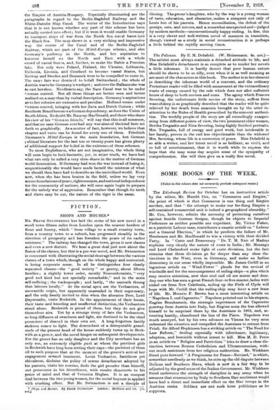FICTION.
SHOPS -AND HOUSES.*
Ma. Fa&xu SWINNERTON has laid the scehe of his new novel in a small town fifteen miles from London upon the nearest borders of Kent and Surrey, which " from village to a small country town, from a country town to a suburb, has progressed steadily in the direction of prosperity and has forsaken the peace of its earlier existence." The railway has changed the town, given it new classes and even a new district. We hear a great deal just now about the fusion of the classes, but this is a pm-war novel, and Mr. Swinnerton is concerned with illustrating the social cleavage between the various classes of a town which, though. on the whole happy and contented, is losing corporate sense. In all he distinguishes four clearly separated classes—the " good society " or gentry, about fifteen families ; a slightly lower order, mostly Nonconformists, " very good and kind but not specially remarkable," and in the main Fell-sufficing ; the tradespeople ; and lastly, " the uncouth throng that labours locally." At the social apex are the Vechantors, of mercantile origin, but apparently unassailed in their supremacy, and the only family invited to dine when the absentee Peer, Lord pay-scombo, visits Beckwith. In the appointment of their house, their taste and breeding and unaffected distinction, the Vechantors stand alone. Beckwith is proud of them, but they do not give themselves airs. Yet by a strange irony of fate the Vechantors, so long diffusers of sweetness and light, are destined to be the chief promoters of discord in their own set. A long-forgotten family skeleton comes to light. The descendant of a disreputable grand- uncle of the present head of the house suddenly turns up in Beck- with as a grocer, and the novel hinges on subsequent developments. For the grocer has an only daughter and the City merchant has an only son, an extremely eligible parti at whom the prettiest girls in Beckwith have long been setting their caps—the prettiest of them all to such purpose that at the moment of the grocer's arrival her engagement seemed imminent. Louis Vechantor, fastidious yet chivalrous, disdains the policy of serene detachment adopted by his parents, visits his cousins, finds the girl prouder than himself, brat perseveres in his friendliness, with results disastrous to his peace of mind and that of Veronica Hughes. It is an unequal duel between the two young women, for the social boycott is applied with crushing effect. But Mr. Swinnerton is not a disciple of • Shops and Houses. By Frank 8einnerto* London Methuen and Co. 17s. aet.1
Gissing. The grocer's daughter, who by the way is a young woman of taste, education, and character, makes a conquest not only of Louis but of his parents. Hence reconciliation, the defeat of the gossips, cats, and minxes, and a somewhat unexpected and—judged by modern methods—unconventionally happy ending. In fine, this is a very clever and well-written novel of manners in transition, though viewed as a study in social reconstruction it is perhaps a little behind the rapidly moving times.


































 Previous page
Previous page